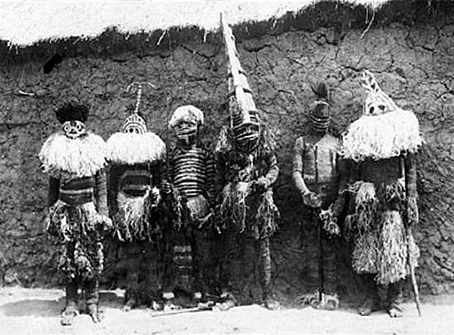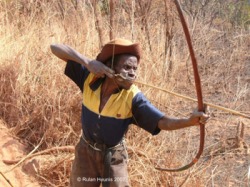Chokwe people
The Chokwe (also Cokwe, Tshokwe or Tschokwe written, the colonial name in Angola was Kioko or Quioco ) are a Bantu ethnic group in Southern Africa. They live mainly in Angola, next in the Democratic Republic of Congo and Zambia.
Society and Culture
The language of the Chokwe is Uchokwe ( Wuchokwe ), many of Chokwe now dominate other languages as a lingua franca - Portuguese in Angola ( however little outside the cities ), English in Zambia and French in the Congo. ISO 639-3: cjk.
In their traditional religion is Kalunga the creator and the supreme power, and there are various ancestral and nature spirits that Mahamba. This religion has led to highly acclaimed artistic works Chokwe, especially masks and wooden sculptures. Today, many Chokwe are Christians, in turn, however, relatively less in Angola.
The Chokwe society is organized under local leaders ( mwana nganga ). This consult with the elders and with ritual specialists before making decisions. The villages are divided into regions that are each guided by heads of families. The society is divided into those derived from matrilineal to the rulers, and the descendants of enslaved formerly of the population. About the local level, there is also a network of regional leaders that spans their settlement areas in the three countries questionable, but occurs slightly in appearance.
Economy
The Chokwe grow crops ( slash and burn ) and grow cassava, yams and peanuts. Tobacco and hemp grown for colds, corn for the production of corn beer. Furthermore, sheep, goats, pigs and chickens are kept, another protein provides hunting. Here, there is a community of hunters from larger game, the yanga while small game is hunted by everyone. Cultivation and processing of food is almost exclusively women's work.
History
The Chokwe possibly descended from the Ambundu and the Mbuti Pygmies. From about 1600 to 1850 they were under the influence of the Lunda states in present-day Angola. In the second half of the 19th century, the development of trade routes from the Chokwe area led to the Angolan coast to an increase in ivory and rubber trade and thus helped the Chokwe to prosperity. This allowed for an expansion of the Chokwe kingdom that eventually even took Lunda. The rise, however, was of short duration; the power of Chokwe soon dwindled due to excessive expansion into southern Angola, introduced diseases and the colonial conquest and domination, which they opposed only little resistance.
The main settlement area of the Chokwe is still the north-east of Angola, so the present provinces of Lunda Norte and Lunda Sul. They live closely with the Lunda, one of whom they have parts absorbed by assimilation. However, until the middle of the 20th century they have traveled in groups in the south and have been located in spaces between other ethnicities.
The Chokwe have hardly involved in the anti-colonial struggle, 1961-1974, nor the civil war in Angola, 1975-2002. As the only ethnic group, they have succeeded, after the introduction of multiparty system in Angola in two elections (1992 and 2008) on a newly formed party, Partido da Renovação Social ( PRS) to send some deputies as their representatives in parliament.
For the cohesion of the Chokwe is important that they have to now have a cross- border network of traditional authorities. In Angola, they show little open to European cultural heritage, are mediated through schools and Christian missions; However, in the growing minority of those who have gone to the cities, however, has changed very rapidly so. Even there, however, one's own language is held high; this explains that the Côkwe, as it has since been written, was awarded by the Angolan government in addition to the Umbundu, the Kimbundu, the Kikongo and the Ukwanyama the status of a national language ( língua nacional ).


.jpg/250px-WLANL_-_Pachango_-_Tropenmuseum_-_Chokwebeeld_(1).jpg)






